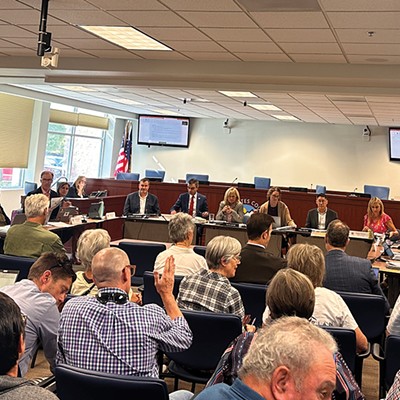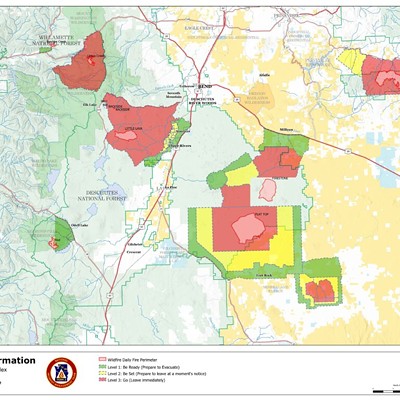Lawmakers passed HB 4002 in March to help address Oregon’s drug crisis through implementing a state-funded collaborative effort between law enforcement and the behavioral health system, encouraging community-based treatment.
While Oregon’s drug decriminalization citizen initiative, Measure 110, offered funds to expand drug treatment capacity, issues came with the lack of incentives to get people into treatment, according to officials.
HB 4002 addresses the increased use of drugs while giving law enforcement the tools to confiscate drugs, stop public drug use and get people into treatment, focusing on rehabilitation over incarceration.
The bill gives counties the ability to create their own deflection programs, giving them the power to implement what they think would work best in their respective areas. While the process may differ from county to county, each will get funding and assistance to help move the process along.
HB 5204, passed alongside HB 4002, increases investments to expand behavioral health treatment capacity, training for health workers, Medication Assisted Treatment in jails, addiction prevention programs, drug courts and criminal justice system capacity.
“This whole setup for HB 4002 isn’t necessarily just to criminalize drugs again. It really is to hold people accountable but still focus with police officers on getting people help. And that’s going to change a paradigm,” said Michael Shults, the corrections division commander with Deschutes County Sheriff’s Office.
Deschutes County deflection
While Deschutes County Behavioral Health initially planned to head up the local deflection program, county officials decided in May to model its program after Marion County, which puts the Sheriff’s Office in charge of deflection. According to Holly Harris, the Deschutes County Behavioral Health director, this allows for a more direct connection to individuals.
In 2018, Marion County created a Law Enforcement Assisted Diversion program which follows the same system as deflection programs, allowing law enforcement to divert low-level offenders away from criminal justice services and toward social services.
In Deschutes County, a person who encounters law enforcement and is charged with drug possession will have the opportunity to request a referral to drug treatment. A designated coordinator, hired by DSCO, will oversee connecting individuals in need of treatment to the providers, initiating the diversion.
According to District Attorney Steve Gunnels, who has played a big part in getting this program on the ground, police will have the discretion to request that someone also charged with other crimes be considered for deflection if they believe its appropriate.
Those working with and encountering people who may have addiction issues, such as defense attorneys, prosecutors and probation officers, will also have the ability to refer someone for deflection.
While many collaborative meetings have helped local partners determine the process and goals, the referral process will likely be phased in.
“It’s going to be up to each department to decide when they start making referrals,” said Gunnels. “The departments, I believe, want to have uniform training on the issue across the department before they start.”
According to Shults with DCSO, a training is scheduled for mid-September, in which officers will receive information and curriculum on the referral process. According to Gunnels, that doesn’t mean that they couldn’t refer someone to deflection between now and whenever training is complete.
While the process has been accelerated for the counties taking part, guidance from Marion County, along with local buy-in from partners, has made Shults optimistic about the program. Offering people the opportunity to get help, he said, will change things for the better.
“If we start hearing ‘yeses,’ then that person’s life will change forever, and if not, for a short period of time. And if they relapse, well, we’ll try it again,” he said.
The road to success
While the program incentivizes the completion of drug treatment, parameters around how and when someone completes treatment have yet to fully be defined. That topic, he said, has been a discussion all around the state, but will likely be up to the treatment providers.
“They’re the experts on that topic, so I’ll defer to them. If they say that a person has completed, then that means that we will close up the criminal referral for the charge.”
Other indications of success will be identified through data and continued evaluation of the program.
To keep track of the success, the Oregon Drug Intervention Plan, created out of HB 5204, requires reporting and data collection around the rollout of the law to ensure equitable enforcement, safer communities and expanded treatment.
“We’re going to continue to try to improve the program as we go and if we see flaws with it, we’ll try to eliminate them and make the program better,” said Gunnels.
Kent Vander Kamp, who’s among two candidates running for Deschutes County Sheriff in the November election, is hopeful about this new chapter in addressing drug addiction. After being in drug enforcement for years, notably as the Sergeant for the Central Oregon Drug Enforcement Team, he noted his continued support for intervention programs. The new program, he said, will give law enforcement the tools to better address public safety.
“I am committed to working closely with all of the stakeholders to ensure the initiative's success,” said Vander Kamp.
According to Gunnels, the DA’s office is ready to start the program whenever the criminal referrals begin coming in, but he expects that the program will be in full swing by October.
Gunnels, who was the drug court prosecutor for a number of years, is a big believer in drug treatment and remains hopeful that Deschutes County can make this a successful program.
“I’ve seen drug treatment work. It takes a good program, but is also takes, probably most importantly, commitment from the people who are addicted to drugs to get better, and this program will give them an opportunity to get better, if they choose to take advantage of it,” said Gunnels.


























